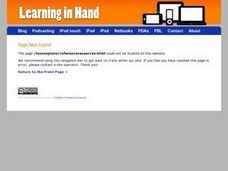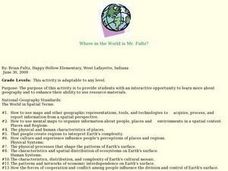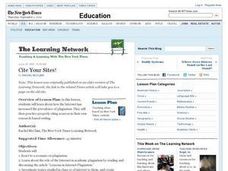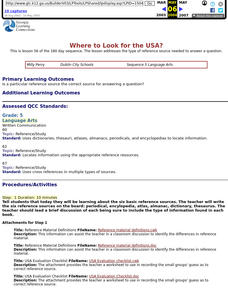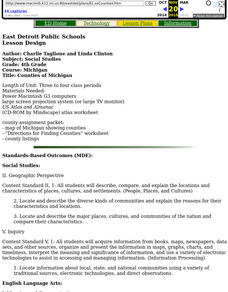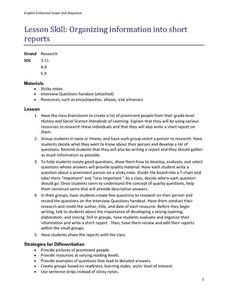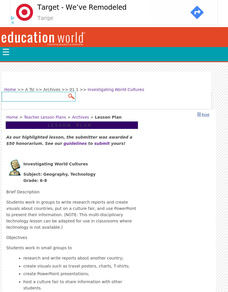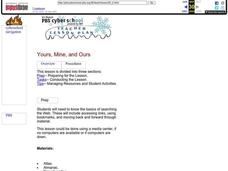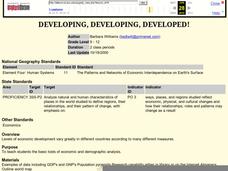Curated OER
Reference Materials
After a class discussion where kids share how they find answers to their questions, learners explore the world of reference materials such as, an atlas, an almanac, and an encyclopedia. The Internet is also discussed as a way to access...
Curated OER
Reference Resources: Being a Good Detective
Learners explore a variety of reference resources while seeking information. atlases, almanacs, dictionaries, encyclopedias, thesauri, and online search engines as well as library card catalogs are utilized in this instructional activity.
Curated OER
Reference Materials
Students discuss reasons to use reference materials, identify correct reference material to use for specific information, find answers to specific questions by locating information in encyclopedia, dictionary, atlas, almanac, glossary,...
Curated OER
Where in the World is Mr. Fultz?
Students use maps and other geographic resources to learn about their world while problem solving. They read clues each day and use classroom resources to narrow down where the prize is located.
Curated OER
What's Your Reference
For this reference material worksheet, students choose the correct reference for each question given. Students discover the differences in the materials found in the dictionary, the almanac, the atlas, the newspaper, and the thesaurus.
Curated OER
Cite Your Sites
What information would you find in an almanac that you would not find in an atlas? What is the difference between a dictionary and a thesaurus? Using a Cite Your Sites worksheet on which they record their observations, groups participate...
Library Sparks
Reference Tools Vocabulary Challenge
Students love the opportunity of going to the library to jump into that one comfy chair in the whole room with a book, or be a lucky one to get to the computers before anyone else. But knowing how to locate books and other reference...
Curated OER
Where to Look for the USA?
Fifth graders, in groups, explore the the type of reference sources are needed to answer a question. Each group identifies where the material was located, and the teacher records the guess.
Curated OER
Being a Good Detective
Students examine a variety of reference resources when seeking information. They discuss atlases, almanacs, dictionaries, encyclopedias, thesauri, online search engines for the Internet, and online library card catalogs. They complete a...
Curated OER
Glossary, Index, and Table of Contents
Fourth graders use two separate sources to learn about index, glossary, and table of contents usage. In this library lesson plan, 4th graders use two books, Learning About Weather with Graphic Organizers, and The World Almanac for Kids,...
Curated OER
Counties of Michigan
Fourth graders complete an atlas worksheet to become familiar with the types of information found in an atlas.
Curated OER
European Elevation Sort
Given a prepared database of European countries, sixth graders sort the countries in ascending order by elevation and identify the five countries with the highest elevations. This cross-curricular lesson combines elements of computer...
Curated OER
Organizing Info into Short Reports
The class brainstorms a list of prominent people from their knowledge of social studies. Groups of two pupils get together and select one of these people to research. They create five questions to research on their person and record them...
Curated OER
Investigating World Cultures
Middle schoolers, in groups, write research reports and create visuals about countries, put on a culture fair, and use PowerPoint to present their information.
Curated OER
Baseball--Where the Parks Are
In this social studies worksheet, students utilize a map to label the location of each city with a Major League team and then with colored pencils label the homes of the All-American Girls League teams.
Curated OER
Fourth Grade Social Studies
For this social studies worksheet, 4th graders answer multiple choice questions about George Washington, early America, natural resources, and more. Students complete 8 questions.
Curated OER
PERCEIVINGT A CULTURE THROUGH ITS LITERATURE
Studentsexamine cultural values in literature, identify the cultural assumptions, prejudices, and purposes of authors and translators, use historical perspective to determine if the values and lifestyle depicted apply to contemporary...
Curated OER
New York City Delights: The Taxi Cab
You set the rate! Step into the shoes of a taxi driver in New York City, and also pretend to be a person who uses taxis to get around town. The class will conduct collaborative research to learn about the history of taxis. Then, they...
Curated OER
Locating Information Quickly in a Variety of Resources
Here is a lesson which may be best suited for a library science teacher, or one that can be done by a regular teacher when in the library. In it, learners explore the best ways to use print and electronic resources to find information...
Curated OER
Word Reference Materials
A class discussion on reference materials opens up a lesson on how to use these important resources. They discover that dictionaries, glossaries, and thesauruses are called word reference resources, and they practice using them. The...
Curated OER
Yours, Mine, and Ours
Young scholars explore the five themes of geography while they conduct Internet research to compare and contrast their city, region, or country with the city and region of Nagano, Japan.
Curated OER
Looking at Lewis and Clark
Fifth graders review information on Lewis and Clark by using a variety of resources. With partners, they travel between stations researching different information based on the expedition. They check each others work and share it with the...
Curated OER
Iraq, Where's That?
Students identify the Middle Eastern countries on the map and the oil-producing countries of OPEC in the region. They examine whether the presence of important producing oil fields qualifies as a characteristic of this region.
Curated OER
Developing, Developing, Developed!
Students differentiate among and explain various levels of economic development around the world. They see that levels of economic development vary greatly in different countries according to many different measures.



